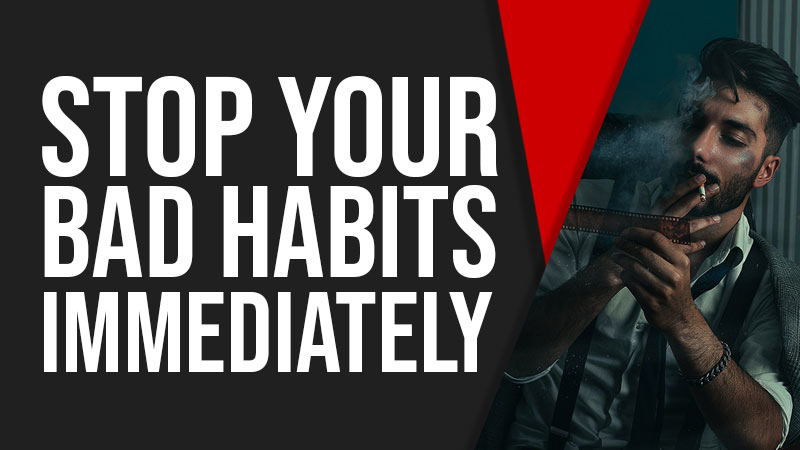How to Stop Your Bad Habits Immediately with 5 Simple Hacks
Share this content :

“I can’t stop overeating, even though I want to lose weight.”
“I know I shouldn’t overthink, but I always do it.”
“I don’t trust myself with my money because I keep buying things online.”
We’ve all had friends with vices that they can’t seem to shake off. Sometimes, they feel too afraid to try. It’s not easy to stop doing what we’re used to. When Benjamin Franklin said, “Old habits die hard,” even he couldn’t have imagined how right he was. We’ve seen different stories about people who cannot stop drinking, smoking, or having eating problems. It’s not easy to quit, especially if you don’t even know how to stop your bad habits.
The good news is that you no longer need to be afraid. I know a few insider secrets about how bad habits work. More importantly, I can tell you exactly how you can stop yourself. That’s right; there is a way to end your bad habits. Here’s what you need to know about your unwanted practices and how to stop your bad habits without issue.
How Habits Thrive
First, let me explain how habits thrive. Habits are routines or patterns of behavior that we’ve developed as part of our mindset and lifestyle. For example, those who love to clean always wash their hands. Some habits form because of how we’re raised or trained. Teaching a child to brush their teeth takes as much patience as teaching a computer technician to build codes. No matter how different the skillset, habits get reinforced and reused throughout our lives.
To break it down further, James Clear, author of Atomic Habits, explained how these patterns emerge in four simple steps. They are:
- Cue
- Craving
- Response
- Reward
Cue
Cues are the triggers or prompts that encourage a response of some kind. It’s like a question that calls for you to answer. According to Clear, cues provide some information that lets our minds expect a reward of some sort. For example, when you enter a diner, you’re exposed to the sight of plates and the smell of food. Even if you aren’t hungry, your mind automatically realizes that this place is where you can eat.
Craving
Cravings are your motivations or desires. They compel you to want or need something. Clear states that cravings don’t necessarily force the action. Instead, they invite us to change how we feel for relief or pleasure. Using our example earlier, entering a restaurant might make your mouth water. Your mind then craves something to fill that need to eat. Before you know it, you suddenly feel the urge to order something to satisfy those taste buds.
Response

Responses are the actions that we do to fulfill a craving. This is where your bad habits occur. Smoking, drinking, and overeating are responses to a specific desire in our minds. Clear mentions that all responses are doable actions. If the person can do so, their response will carry through. For example, if you don’t have enough cash to eat at the diner, you will most likely be unsatisfied. However, if you have money, you’ll buy a nice meal, like a serving of eggs and bacon with coffee on the side.
Reward
Rewards are the reinforcement or benefits you feel once you pull off your action. As Clear explains, it’s the end goal for all of our habits. We desire to feel satisfied or happy in some way. Ultimately, our cues, cravings, and responses all work to get us a reward of some sort. To finish our example, eating that meal at the diner will likely fill your stomach and satisfy your hunger.
The Problem With Bad Habits
Using the diner scenario, I’ve outlined how James Clear breaks down habits and how they occur. Now, by itself, the diner example doesn’t sound bad. However, imagine if the person is overweight or has high blood pressure. Eating eggs and bacon may not be the best option, especially once it poses a mental or physical problem. Therein lies our question: how come we keep our bad habits? Here are four main reasons why you find yourself repeating these poor practices. By knowing what makes them stay, you’ll be able to discover how to stop your bad habits.
Routine
The first reason is that you’ve fallen into the pattern so much that it’s almost automatic. You’ve probably met people who promised to stop smoking, only to have another cigarette the next day. When you ask them why they reply, “Before I knew it, I just did it.”
Unfortunately, our minds can be stubborn to a fault. It will be tough to change when we’re so used to performing certain habits. The problem with bad habits is that we might be so accustomed to them that we instinctively go along for the ride. That’s why understanding your routine is a good step when learning how to stop your bad habits.

Compromise
I know friends and family who’ve declared a new diet plan as their New Year’s Resolution. By the next month, they’re back to snacking and fine dining. When I ask what changed, they tell me, “It’s just this one meal. Plus, I’ve already exercised this week.” or some variation of that line.
Again, our minds can get so fixated on the rewards that we compromise. We might think that a cheat meal or a quick snack is okay. When done on occasion or for strict diets, then it might be alright. However, we might go overboard and start spoiling ourselves with too much of the same problem. Before we know it, we’ve fallen back to step one.
Stress Relief
Sometimes, the reward itself is the biggest motivation. People who drink or do drugs might not even enjoy what they do. However, they all think about how stress-free or relieved they feel afterward. It’s the most challenging part of bad habits; sometimes, they’re an easy fix for our stress.
For example, impulsive buyers may want more things to make them happy. It doesn’t justify their behavior, but we can see why they would keep doing it. It’s not easy to give up on what we do when it makes us happy. That’s why knowing how to stop your bad habits requires understanding that some rewards aren’t worth it.
Peer Pressure
There are times when people can change their diet, get sober, and refrain from cigarettes for a few months. Then, when they meet with old friends, they suddenly return to their old ways.
Sadly, the reason why is because their friends are not the best influence. People who insist you try one more drink or eat another snack might not care about your attempts to change.
Sometimes, they might not know that you want to change. Other times, though, they might frown upon your new lifestyle and see you as weak. You might surrender to their judgment and fall back to your vices, thinking it’s better to have friends instead. So when you think of how to stop your bad habits, consider if your environment, and the people in it, are part of the problem.
The Five Hacks To Stop Bad Habits
The previous four reasons are always going to tempt us in our lives. It might be tough to completely ignore them, even when you’ve done so for years. However, you can still master your self-discipline and stop these bad habits from happening. How so? Here are five simple hacks that you can use to learn how to stop your bad habits right away.
1. Identify the Trigger
Knowing what prompts you is the first step you need to take. To understand how to stop your bad habits, you first have to recognize what triggers them. You might have a visual reminder of your habit that keeps calling back to you. So, sometimes, you’ll need to follow the principle “out of sight, out of mind.”
For example, those trying to diet might still have a jar of cookies or a bag of chips in their pantry. If these things keep calling your attention, it’s best to eliminate them immediately. You can store them somewhere out of sight or ask a friend to take them away instead.

If it’s something that other people do, like coworkers eating snacks, try to divert your attention. You could walk outside to erase the image, close your eyes, and meditate. You might even ask them to face the other direction or to look away when they eat their snacks, once you explain why you’re making such a request.
2. Change the Response
Cues and cravings will occur at any time. Smokers might be stressed at work and feel the need for another cigarette. However, that doesn’t mean smoking is the only response you can go to. Once you identify your triggers, try to create a more positive outlet for your desires. For example, try writing all your thoughts in a journal if you’re stressed. You might be surprised how relaxing it is to list how you feel on pen and paper.
James Clear takes it a step further, stating that we could practice new routines to change bad habits into good ones. If we feel stressed, we could focus on exercise and meditation. However, to make it easier, he insists on using actions that only take two minutes. The more we practice these two-minute routines, the more we can build our new habits.
For example, instead of trying to jog every morning, make it a habit to reach for your running shoes. Soon, you’ll be compelled to use them for a pleasant stroll around the block. In time, it can turn into a relaxing jog, a fast sprint, or even a mile-long run. As long as you shift your response from something bad to something good, you can demonstrate how to stop your bad habits.
3. Accept Your Failures and Try Again
Some people lose hope when they slip up or break their streak. For example, someone on a four-month diet might go to a family outing and enjoy a nice meal. They then get anxious and think that they’ve ruined their diet completely. It’s normal to stumble or make a mistake, especially when starting.
However, that shouldn’t be a reason to give up everything. Instead, take it as a lesson and try again tomorrow. Work harder to avoid taking a cigarette or eating another delicious donut. Failing once in a while is normal. Remember, a key part of knowing how to stop your bad habits is to accept that you aren’t perfect. What matters is that you consciously choose to improve and discipline yourself again.
4. Take It Slow
Those who try to stop their bad habits might go overboard. I’ve had friends who’ve attempted to quit smoking or go on intense crash-course diets. Even if they manage a month’s worth of extreme control, they eventually redo their bad habits. Why is that?
They tried too much too soon. I believe moderation is essential in all lifestyle changes. It’s not fair to expect someone who drinks three bottles daily to stop drinking altogether. It’s not easy to force them to go cold turkey.
Instead, I believe that all habits should be cut down bit by bit. If you’re a smoker and take four cigarettes daily, cut down by one stick per week. Soon, your body and mind will adjust to the slow changes, and you might find yourself smoke-free. Taking things in moderation helps you plan your routine while also giving you time to adjust.
5. Celebrate Your Wins
Working to build a routine is not easy, and it can sometimes cause you to question yourself. That’s why you need to pat yourself on the back once in a while.
Celebrating small successes is important to remind you of your journey to a new lifestyle.
For example, there are many inspirational weight-loss stories where the person takes a picture of themselves every day. A year after, they look back and are amazed by the changes between then and now. It’s worth smiling about.
When you work hard to improve your lifestyle, always find a time to reflect and congratulate yourself. It’s the best way to realize that you are strong and in control. By recognizing how much you’ve changed, you’ll realize how to stop your bad habits. More importantly, you’ll discover that change is possible, both in your life and in others.

Share this content :
Copyright © 2023 Munif Ali. All rights reserved.

